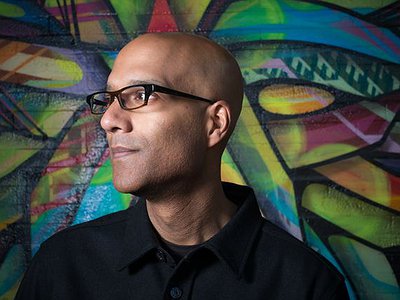Music journalism has frequently been attacked for merely expressing opinion. On the other hand, it is precisely personal interest in an artist and/or his work which frequently provides for a stimulus to delve into them in more depth. How would you describe the importance of subjectivity for your writing?
Subjectivity is everything. As we’ve discussed, the choice of artist is subjective. The nature of the conversation is entirely subjective. I think people visit Innerviews because they know they’re getting a real synergy of thought between the writer and the artist. The perspectives of the writer are absolutely what drive the nature of the conversation.
I don’t think subjectivity is the problem. I think it’s music journalists who use reviewing music as a vehicle for expressing their own personal issues, exposing petty ego gratification stuff, and for showing how damn clever they think they are. Some nameless music journalists have the misfortune of being afflicted by all three of those simultaneously. None of them have any place in music journalism. If you want to write about music, do it from a place of honesty and because you actually care about the music. If you’re doing it for any other reason, do us all a favor and get out immediately and become a politician instead.
In which way does writing and reading about music change the way it is perceived by the public?
My hope is it doesn’t change anything about the music for the public. Good, well-intentioned music journalism should simply serve as a gateway through which people can discover quality stuff. In rare cases, a music journalist can take a maligned or vilified piece of music and bring positive attention to it because of their passion for it, so in that way, it is possible to change perceptions. But at the end of the day, as that famous, seemingly-impossible-to-attribute saying goes, 'Writing about music is like dancing about architecture.'
Whom do you feel your obligation is to—the artists, the readers, the publication you're writing for? In how much do you feel is music journalism restricted by external factors?
First and foremost, the obligation is to myself. I want to create something that I feel is of value and isn’t just the stock regurgitation of what’s already been expressed elsewhere. I think most Innerviews readers are aligned with that concept. In a general sense, music journalism, especially at the mainstream media level, is very much restricted by external factors.
I personally know many music journalists that aren’t allowed to write about who they want to write about. They have to cover 'what’s hot' and what will sell. There is serious editorial pressure that emanates from the two-headed advertising-demography beast that dictates the majority of what qualifies as music journalism these days. However, independent voices persist and you see that in myriad Web-based publications and their mobile offspring.
Journalism and writing have changed considerably over the past century. What, do you feel, could – or should - be new forms and formats for music journalism?
I’ve been saying for the longest time that the print music magazine is in the process of dying. The evidence is all around us. The Word and Spin are recent print casualties. Q and NME are seeing their readership drop 20 percent year on year. Clearly, all the energy is online and on mobile these days. People want total flexibility in how they access media and music journalism needs to embrace that. Amazingly, very few print music magazines are effectively making the shift to the inevitable all-digital future. I can only think of a handful that are doing it well. So many of them are so locked into a short-term outlook. What they’re actually locked into is their inevitable demise.
The great thing about online is when it’s intelligently deployed as a vehicle for music journalism, it can be truly long-form. Word counts on some Innerviews pieces run upwards of 14,000.
Music-sharing sites and blogs as well as a flood of releases in general are presenting both listeners and artists with challenging questions. What's your view on the value of music today?
For me, it’s the same as it ever was. I believe in paying for music and supporting artists’ livelihoods. It’s like Western society had a collective mental breakdown when it suddenly decided musicians weren’t worth paying for their work. Music, to me, is the most important art form in the universe. Outside of the pulse and rhythm within my veins, it’s the soundtrack that propels me through life. I know that holds true for a huge percentage of the population. I realize some artists are adopting 'free' models for distributing music, but the vast majority are seeking compensation for their efforts.
If you have the ability to pay for music and you’re not doing it, when that is what the musician asks of you, you’re basically a vampire, sucking the life out of the artist. You need to take a cold, hard look at your values if you think for one second this is right or sustainable. You’re basically an amoral entity engaged in theft. What you’re doing is absolutely no different from walking down to the corner store and grabbing bread, milk and butter off the shelf, turning around and giving the shopkeeper the middle finger, and running out the door. Exact same thing.
Please recommend two magazines or journalists to our readers which you feel deserve their attention.
I think John Kelman at All About Jazz continues to create excellent long-form music journalism that I consider highly valuable. He also covers a wide variety of artists, including many beyond the borders of jazz, who are of great interest to me. Highly recommend.
Sid Smith, who runs a lovely blog called Postcards From The Yellow Room, as well as writes for several music magazines, is another excellent journalist I have followed for many years. Like John, Sid doesn’t worry about genres, fashion, wardrobe malfunctions, or who’s dating a Kardashian. It’s all about the art for those two, and they’ve devoted their lives to getting the word out about music that matters.
Please recommend two artists to our readers which you feel deserve their attention.
Tim Motzer, a brilliant, adventurous artist based in Philadelphia, is someone all of your readers should know about. He’s a superb composer and guitarist who criss-crosses multiple musical universes, including jazz, fusion, prog, hip-hop, soul, electronica, and the avant-garde. He runs the 1k Recordings label, which has an incredible catalog of genre-defying releases that deserve a far wider audience.
Markus Reuter is another multi-genre talent people should check out. He’s currently part of Stick Men, with Tony Levin and Pat Mastelotto. Markus is based in Austria and is one of the great Touch guitarists in the world. He’s released several dozen recordings solo, and with groups including Centrozoon, Tuner, Europa String Choir, Ian Boddy, Robert Rich, and countless others. He’s a deeply diverse musician informed by sharply-tuned philosophies. Another great artist for the open-minded.
Read Anil Prasad's work at www.innerviews.org




